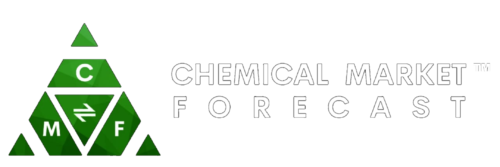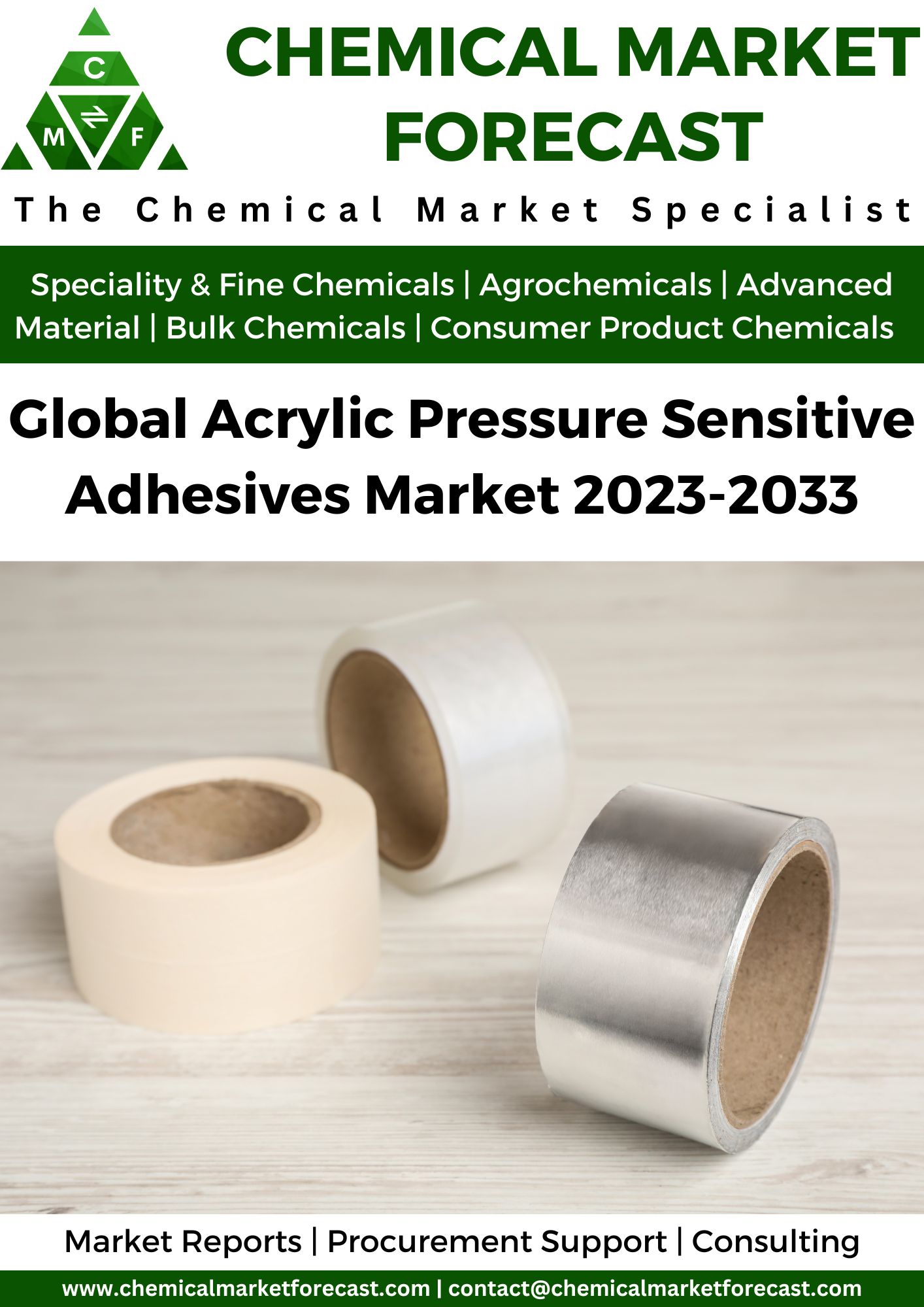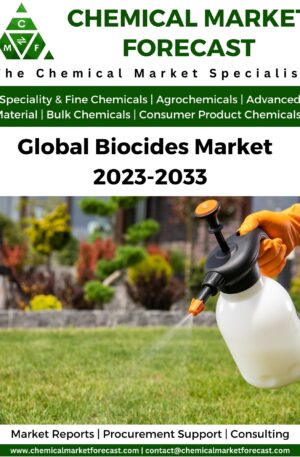Global Acrylic Pressure Sensitive Adhesives (PSA) Market Report
Acrylic Pressure Sensitive Adhesives (PSA) are a type of adhesive that is widely used in a variety of industries due to its unique properties, such as excellent adhesion, resistance to water and UV light, and high transparency. The global market for acrylic PSA is expected to grow significantly in the coming years, driven by increasing demand from various end-use industries.
One of the key drivers of the acrylic PSA market is the growing demand from the automotive industry. Acrylic PSA is widely used in the automotive industry for bonding and sealing applications, such as attaching exterior trim, bonding interior trim, and sealing windshield and roof seams. As the automotive industry continues to grow, particularly in emerging markets such as Asia-Pacific, the demand for acrylic PSA is expected to increase.
Another important factor driving the growth of the acrylic PSA market is the increasing use of adhesive tapes in various industries. Adhesive tapes are widely used in the construction, packaging, and electronics industries, among others, and acrylic PSA is a popular choice due to its excellent adhesion and transparency. As these industries continue to grow, the demand for acrylic PSA is expected to increase.
The healthcare industry is also a key driver of the acrylic PSA market. Acrylic PSA is widely used in medical applications, such as wound dressings, surgical tapes, and drug delivery systems, due to its biocompatibility and non-toxicity. As the healthcare industry continues to grow, particularly in emerging markets, the demand for acrylic PSA is expected to increase.
However, there are also several challenges facing the acrylic PSA market. One of the major challenges is the volatility of raw material prices. The key raw materials used in the production of acrylic PSA, such as acrylic acid and butyl acrylate, are subject to price fluctuations due to changes in supply and demand, as well as other factors such as political instability and natural disasters. This can make it difficult for manufacturers to maintain stable pricing and supply chain operations.
Another challenge facing the acrylic PSA market is the increasing competition from other types of adhesives, such as silicone and polyurethane. These adhesives offer similar properties to acrylic PSA and are often cheaper, making them an attractive alternative for some applications. This can put pressure on acrylic PSA manufacturers to innovate and develop new products with unique properties and applications.
There are several key suppliers of acrylic pressure sensitive adhesives (PSA) in the market, including 3M, Avery Dennison, Henkel AG & Co. KGaA, H.B. Fuller, and Arkema Group. These companies are major players in the adhesive industry and have established themselves as leading suppliers of acrylic PSA. 3M is one of the largest suppliers of acrylic PSA in the market, offering a wide range of products for various applications, including automotive, construction, and healthcare. Avery Dennison is another major supplier of acrylic PSA, with a focus on packaging and labeling applications. Henkel AG & Co. KGaA is a leading supplier of industrial adhesives, including acrylic PSA, with a strong presence in Europe and North America. H.B. Fuller is a global supplier of adhesives and sealants, offering a variety of acrylic PSA products for various applications. Arkema Group is a major supplier of specialty chemicals, including acrylic PSA, with a focus on sustainability and innovation in the adhesive industry. These key suppliers have established themselves as leaders in the acrylic PSA market through their extensive product offerings, strong distribution networks, and focus on customer satisfaction.
In conclusion, the acrylic PSA market is expected to grow significantly in the coming years, driven by increasing demand from various end-use industries such as automotive, construction, packaging, electronics, and healthcare. However, there are also challenges facing the market, such as raw material price volatility and increasing competition from alternative adhesives. To remain competitive, manufacturers must focus on innovation and product development to meet the changing needs of their customers.
Table of Contents
Global Acrylic Pressure Sensitive Adhesives (PSA) Report
1 Market Introduction of Acrylic Pressure Sensitive Adhesives (PSA) Market Report
2 Market Segmentation of Acrylic Pressure Sensitive Adhesives (PSA) Market Report
2.1 Acrylic Pressure Sensitive Adhesives (PSA) Market Segmentation By Region
2.2 Acrylic Pressure Sensitive Adhesives (PSA) Market Segmentation By Type
2.3 Acrylic Pressure Sensitive Adhesives (PSA) Market Segmentation By Crop Type
3 Cost Structure of Acrylic Pressure Sensitive Adhesives (PSA) Market Report
4 Country Analysis of Acrylic Pressure Sensitive Adhesives (PSA) Market Report
4.1 China
4.1.1 Acrylic Pressure Sensitive Adhesives (PSA) Market Forecast & Size in China
4.1.2 Acrylic Pressure Sensitive Adhesives (PSA) Market Trends & Analysis in China
4.1.3 Key Acrylic Pressure Sensitive Adhesives (PSA) companies in China
4.1.4 Regulatory Framework of Acrylic Pressure Sensitive Adhesives (PSA) Market in China
4.2 Germany
4.2.1 Acrylic Pressure Sensitive Adhesives (PSA) Market Size in Germany
4.2.2 Acrylic Pressure Sensitive Adhesives (PSA) Market Trends & Analysis in Germany
4.2.3 Key Acrylic Pressure Sensitive Adhesives (PSA) companies in Germany
4.2.4 Regulatory Framework of Acrylic Pressure Sensitive Adhesives (PSA) Market in Germany
4.3 France
4.3.1 Acrylic Pressure Sensitive Adhesives (PSA) Market Size in France
4.3.2 Acrylic Pressure Sensitive Adhesives (PSA) Market Trends & Analysis in France
4.3.3 Key Acrylic Pressure Sensitive Adhesives (PSA) companies in France
4.3.4 Regulatory Framework of Acrylic Pressure Sensitive Adhesives (PSA) Market in France
4.4 Italy
4.4.1 Acrylic Pressure Sensitive Adhesives (PSA) Market Size in Italy
4.4.2 Acrylic Pressure Sensitive Adhesives (PSA) Market Trends & Analysis in Italy
4.4.3 Key Acrylic Pressure Sensitive Adhesives (PSA) companies in Italy
4.4.4 Regulatory Framework of Acrylic Pressure Sensitive Adhesives (PSA) Market in Italy
4.5 Netherland
4.5.1 Acrylic Pressure Sensitive Adhesives (PSA) Market Size in Netherland
4.5.2 Acrylic Pressure Sensitive Adhesives (PSA) Market Trends & Analysis in Netherland
4.5.3 Key Acrylic Pressure Sensitive Adhesives (PSA) companies in Netherland
4.5.4 Regulatory Framework of Acrylic Pressure Sensitive Adhesives (PSA) Market in Netherland
4.6 Russia
4.6.1 Acrylic Pressure Sensitive Adhesives (PSA) Market Size in Russia
4.6.2 Acrylic Pressure Sensitive Adhesives (PSA) Market Trends & Analysis in Russia
4.6.3 Key Acrylic Pressure Sensitive Adhesives (PSA) companies in Russia
4.6.4 Regulatory Framework of Acrylic Pressure Sensitive Adhesives (PSA) Market in Russia
4.7 Canada
4.7.1 Acrylic Pressure Sensitive Adhesives (PSA) Market Size in Canada
4.7.2 Acrylic Pressure Sensitive Adhesives (PSA) Market Trends & Analysis in Canada
4.7.3 Key Acrylic Pressure Sensitive Adhesives (PSA) companies in Canada
4.7.4 Regulatory Framework of Acrylic Pressure Sensitive Adhesives (PSA) Market in Canada
4.8 Mexico
4.8.1 Acrylic Pressure Sensitive Adhesives (PSA) Market Size in Mexico
4.8.2 Acrylic Pressure Sensitive Adhesives (PSA) Market Trends & Analysis in Mexico
4.8.3 Key Acrylic Pressure Sensitive Adhesives (PSA) companies in Mexico
4.8.4 Regulatory Framework of Acrylic Pressure Sensitive Adhesives (PSA) Market in Mexico
4.9 Singapore
4.9.1 Acrylic Pressure Sensitive Adhesives (PSA) Market Size in Singapore
4.9.2 Acrylic Pressure Sensitive Adhesives (PSA) Market Trends & Analysis in Singapore
4.9.3 Key Acrylic Pressure Sensitive Adhesives (PSA) companies in Singapore
4.9.4 Regulatory Framework of Acrylic Pressure Sensitive Adhesives (PSA) Market in Singapore
4.10 United Kingdom
4.10.1 Acrylic Pressure Sensitive Adhesives (PSA) Market Size in United Kingdom
4.10.2 Acrylic Pressure Sensitive Adhesives (PSA) Market Trends & Analysis in United Kingdom
4.10.3 Key Acrylic Pressure Sensitive Adhesives (PSA) companies in United Kingdom
4.10.4 Regulatory Framework of Acrylic Pressure Sensitive Adhesives (PSA) Market in United Kingdom
4.11 Switzerland
4.11.1 Market Size in Switzerland
4.11.2 Market Trends & Analysis in Switzerland
4.11.3 Key Acrylic Pressure Sensitive Adhesives (PSA) companies in Switzerland
4.11.4 Regulatory Framework of Acrylic Pressure Sensitive Adhesives (PSA) Market in Switzerland
4.12 Brazil
4.12.1 Market Size in Brazil
4.12.2 Market Trends & Analysis in Brazil
4.12.3 Key Acrylic Pressure Sensitive Adhesives (PSA) companies in Brazil
4.12.4 Regulatory Framework of Acrylic Pressure Sensitive Adhesives (PSA) Market in Brazil
4.13 USA
4.13.1 Market Size in US
4.13.2 Market Trends & Analysis in US
4.13.3 Key Acrylic Pressure Sensitive Adhesives (PSA) companies in US
4.13.4 Regulatory Framework of Acrylic Pressure Sensitive Adhesives (PSA) Market in US
4.14 Japan
4.14.1 Market Size in Japan
4.14.2 Market Trends & Analysis in Japan
4.14.3 Key Acrylic Pressure Sensitive Adhesives (PSA) companies in Japan
4.14.4 Regulatory Framework of Acrylic Pressure Sensitive Adhesives (PSA) Market in Japan
4.15 South Korea
4.15.1 Market Size in South Korea
4.15.2 Market Trends & Analysis in South Korea
4.15.3 Key Acrylic Pressure Sensitive Adhesives (PSA) companies in South Korea
4.15.4 Regulatory Framework of Acrylic Pressure Sensitive Adhesives (PSA) Market in South Korea
4.16 India
4.16.1 Market Size in India
4.16.2 Market Trends & Analysis in India
4.16.3 Key Acrylic Pressure Sensitive Adhesives (PSA) companies in India
4.16.4 Regulatory Framework of Acrylic Pressure Sensitive Adhesives (PSA) Market in India
4.17 Thailand
4.17.1 Market Size in Thailand
4.17.2 Market Trends & Analysis in Thailand
4.17.3 Key Acrylic Pressure Sensitive Adhesives (PSA) companies in Thailand
4.17.4 Regulatory Framework of Acrylic Pressure Sensitive Adhesives (PSA) Market in Thailand
4.18 Russia
4.18.1 Market Size in Russia
4.18.2 Market Trends & Analysis in Russia
4.18.3 Key Acrylic Pressure Sensitive Adhesives (PSA) companies in Russia
4.18.4 Regulatory Framework of Acrylic Pressure Sensitive Adhesives (PSA) Market in Russia
4.19 Malaysia
4.19.1 Market Size in Malaysia
4.19.2 Market Trends & Analysis in Malaysia
4.19.3 Key Acrylic Pressure Sensitive Adhesives (PSA) companies in Malaysia
4.19.4 Regulatory Framework of Acrylic Pressure Sensitive Adhesives (PSA) Market in Malaysia
4.20 Saudi Arabia
4.20.1 Market Size in Saudi Arabia
4.20.2 Market Trends & Analysis in Saudi Arabia
4.20.3 Key Acrylic Pressure Sensitive Adhesives (PSA) companies in Saudi Arabia
4.20.4 Regulatory Framework of Acrylic Pressure Sensitive Adhesives (PSA) Market in Saudi Arabia
5 Global Acrylic Pressure Sensitive Adhesives (PSA) Market Trends
5.1 Acrylic Pressure Sensitive Adhesives (PSA) Market Trends- Key Drivers
5.2 Acrylic Pressure Sensitive Adhesives (PSA) Market Trends- Key Restraints
5.3 Acrylic Pressure Sensitive Adhesives (PSA) Market Trends- Key Challenges
5.4 Porter’s Five Forces Analysis of Acrylic Pressure Sensitive Adhesives (PSA) Market
5.5 PEST Analysis- Acrylic Pressure Sensitive Adhesives (PSA) Market
6 Global Acrylic Pressure Sensitive Adhesives (PSA) Market Forecast
6.1 Acrylic Pressure Sensitive Adhesives (PSA) Market Forecast By Region
6.1.1 North America
6.1.2 Europe
6.1.3 APAC
6.1.4 Middle East
6.1.5 ROW
6.2 Acrylic Pressure Sensitive Adhesives (PSA) Market Forecast By Type
6.2.1 Fertilizer
6.2.2 Pesticide
6.3 Acrylic Pressure Sensitive Adhesives (PSA) Market Forecast By Crop Type
6.3.1 Fruits & Vegetables
6.3.2 Oilseed and Pulses
6.3.3 Cereals & Grains
6.3.4 Other
7 Supply Chain of the Acrylic Pressure Sensitive Adhesives (PSA) Market Analysis
8 Opportunity Analysis
9 Scenario Analysis
10 Key Company Profiles
11 Strategic Conclusions – Acrylic Pressure Sensitive Adhesives (PSA) Market Report
12 Abbreviations used in Acrylic Pressure Sensitive Adhesives (PSA) Market Report






Reviews
There are no reviews yet.